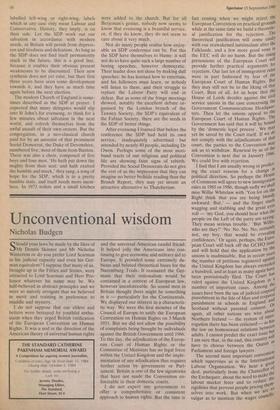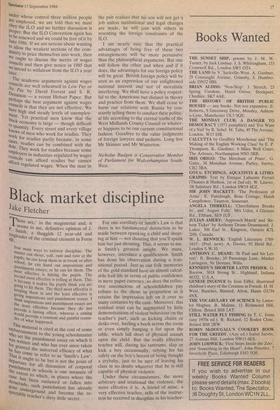Unconventional wisdom
Nicholas Budgen
Should your laws be made by the likes of Mr Dennis Skinner and Mr Nicholas Winterton or do you prefer Lord Scarman in his judicial capacity and even his Ger- man equivalent? I suppose that many of us, brought up in the Fifties and Sixties, were attracted to Lord Scarman and Herr Pro- fessor whatever his name may be. We half-believed in abstract principles and we were so naively arrogant that we believed in merit and training in preference to muddle and mystery.
I do not suppose that our elders and betters were betrayed by youthful enthu- siasm when they urged British ratification of the European Convention on Human Rights. It was a nod in the direction of the American theory of universal human rights
and the universal American candid friend. It helped jolly the Americans into con- tinuing to give economic and military aid to Europe. It provided some extremely du- bious and belated theoretical bases for the Nuremburg Trials. It reassured the Ger- mans that their nationalism would be contained in a context of European law, however /unenforceable. So sound men in Britain thought there might be something in it — particularly for the Continentals. We displayed our interest in a characteris- tic way. We were the first member of the Council of Europe to ratify the European Convention on Human Rights on 3 March 1951. But we did not allow the possibility of complaints being brought by individuals against the British Government until 1966. To this day, the adjudication of the Europ- ean Court of Human Rights or the Committee of Ministers has no legal force within the United Kingdom and the imple- mentation of any adjudication thus requires further action by government or Parl- iament. Britain is one of the few signatories that have not made the Convention en- forceable in their domestic courts.
I do not expect any government to offer a comprehensive or consistent approach to human rights. But the time is
fast coming when we might reject the European Convention on practical grounds while at the same time we build a theoretic- al justification for the rejection. The theoretical justification will come easilY with our reawakened nationalism after the Falklands, and a few more good rows in the EEC will do no harm. But the rising pretensions of the European Court will provide further practical arguments for rejection. Our last lot of immigration rules were in part fashioned by fear of the European Court of Human Rights. But they may still not be to the liking of that Court. Best of all, let us hope that the House of Lords decides against the civil service unions in the case concerning the Government Communications Headquar- ters. Then let the unions appeal to the European Court of Human Rights. Thee Government has said that it will 14e boulai by the 'domestic legal process'. We may yet be saved by the Court itself. If we d° not comply with the adjudications of that court, the parties to the Convention may ask us to withdraw. Renewal by us of the Convention is next due in January 1986' We could live with rejection. I find that I am usually wrong in predict- ing the exact reasons for a change in political direction. So perhaps the House of Commons will agree to new immigration rules in 1985 or 1986, though sadly we shall miss Willie Whitelaw with 'You lot on the Right think that you are being bloody awkward. But,' — and the finger starts wagging and stabbing and the great eyes roll — 'my God, you should hear what the people on the Left of the party are saying- They mean serious trouble."But who are they?"No. No. No. No, certainly not, my boy, that would be nvealing confidences.' Or again, perhaps, the Eur°- pean Court will back off the GCHQ issa,_e and will hold that the application by the unions is inadmissible. But in recent year! thenumber of petitions registered agaIng, the United Kingdom has always exceeded a hundred, and at least as many again have been provisionally filed. The Court has ruled against the United Kingdom in° number of important cases. Among the issues have been the use of judicial corPoral punishment in the Isle of Man and corpor pr punishment in schools in England a,,I1, u Scotland without parental consent. 't again, all other nations are wise about Northern Ireland — the system of inter- rogation there has been criticised — as has the law on homosexual relations between .t adults. I cannot predict the exact issue 11'.11 I am sure that, in the end, this countrY have to choose between the Queen I" Parliament and foreign lawyers. The second most important conventil which supervises us is the Internatioll:t Labour Organisation. We hear grey deal, particularly from the Chancellor °e the Exchequer, about the need to make the labour market freer and to reduce `„„, rigidities that prevent people pricing the ":0 selves into work. But when we are vulgar as to mention the wages councils under whose control three million people are employed, we are told that we must obey the ILO and no further discussion is Proper. But the ILO Convention again has to be renewed and we could be free of it by June 1986. If we are serious about wanting to allow the weakest sections of the com- munity to price themselves into work, then We ought to discuss the merits of wages councils and then give notice in 1985 that We intend to withdraw from the ILO a year later, The academic arguments against wages councils are well rehearsed in Low Pay or No Pay by David Forrest and S. R. Dennison — a recent Hobart Paper. But Perhaps the best argument against wages councils is that they are not effective. We have high and steady levels of unemploy- !tent. Yet practical men know that the black economy is large — though difficult to quantify. Every street and every village knows of men who work for readies. They work for readies partly because, in some ?ses, readies can be combined with the oole. They work for readies because some employers in industries regulated by wages councils can afford readies but cannot afford regulated wages. When the man in
the pub realises that his son will not get a job unless institutional and legal changes are made, he will join with others in resenting the foreign constraints of the ILO.
I am nearly sure that the practical advantages of being free of these two entanglements will be more persuasive than the philosophical arguments. But one will follow the other and when and if it does, the advantages for our foreign policy will be great. British foreign policy will be seen as an expression of our enlightened national interest and not of moralistic interfering. We shall have a policy respect- ful to the Americans but distinct in theory and practice from them. We shall cease to harm our relations with Russia by con- stantly telling them to conduct their politic- al life according to the eternal truths of the West Midlands County Council or whatev- er happens to be our current constitutional fashion. Goodbye to the value judgments of foreign lawyers and pedants. Long live Mr Skinner and Mr Winterton.
Nicholas Budgen is Conservative Member of Parliament for Wolverhampton South- West.



















































 Previous page
Previous page